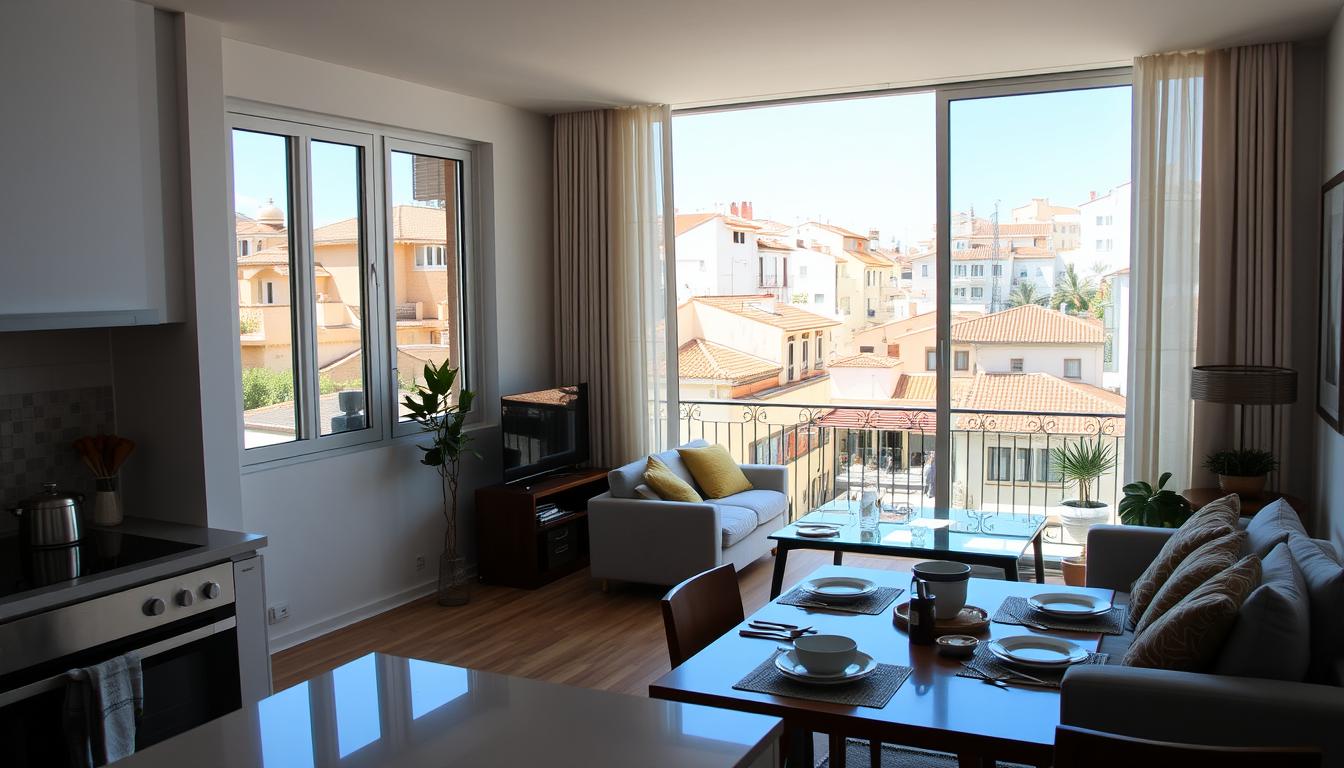Exploring the Spanish property market is exciting but complex. We need to understand renting and buying in Spain. The local market has its own rules and chances that can change our experience.
Knowing the legal needs and services available helps us make smart choices. This way, we can move through the market with confidence.
Our guide is here to help UK renters and buyers. LerriHost offers special services for expats in Spain. This introduction prepares you for the Spanish real estate world.
Understanding the Rental Market in Spain
Exploring the rental market in Spain reveals several important factors. These elements help both expats and locals understand the rental prices better. Location, property type, and economic conditions are key in setting prices across different areas.
Key Factors Influencing Rental Prices
Rental prices are shaped by several factors:
- Location: Properties in sought-after areas cost more due to high demand.
- Property Type: The size, age, and features of a property impact its rental value.
- Economic Factors: Market trends, inflation, and job rates affect price changes.
Popular Areas for Renting
Some cities in Spain are more popular for renting. This is because of their great amenities and lively atmospheres. Cities like:
- Barcelona: Famous for its culture and beach life.
- Madrid: Offers a mix of work and fun.
- Valencia: Known for its pleasant weather and calm vibe.
Advantages of Renting vs. Buying
Choosing between renting and buying depends on what you prefer. Renting has many benefits, mainly for expats:
- Flexibility: Renting makes moving easier without the big commitment of buying.
- Lower Initial Costs: Renting usually means less money upfront than buying.
- Maintenance and Repairs: Landlords usually handle upkeep, saving tenants from these costs.
Understanding the rental market in Spain helps us make better choices. Knowing what affects prices and the charm of certain areas makes renting in Spain more enjoyable. It adds to the vibrant Spanish lifestyle.
Legal Framework for Renting in Spain
Knowing the legal side of renting in Spain is key for success. The law sets out the rules for rental agreements, covering tenant rights and duties. It’s important to understand lease terms to avoid problems and follow local rules.
Basics of Spanish Tenancy Law
Spanish tenancy law sets the rules for rental contracts. It talks about how long leases can last and how they can end. Most residential leases are for at least five years, giving tenants stability. Landlords must have a good reason to kick tenants out, following strict rules.
Rights and Responsibilities of Tenants
Tenants in Spain have the right to a safe and decent place to live. They must get all the details about the lease before signing. Tenants need to pay rent on time and keep the property in good shape. Knowing these rules helps for a smooth renting experience.
Common Lease Terms
It’s helpful to know about common lease terms before signing. Leases often cover things like deposits, who pays for utilities, and who does maintenance. These terms should be fair and follow the latest renting laws for both landlords and tenants.
Introduction to LerriHost Services
At LerriHost, we focus on helping expats and international investors in Spain. We make setting up a business or moving here easier. Our goal is to ensure a smooth transition into the Spanish market.
Company Formation in Spain
We handle all parts of setting up a company in Spain. This includes advice on legal structures like SL and SA. We help with documents, registration, and following local rules.
Starting a company can seem overwhelming. But with LerriHost, you have a trusted partner to help every step of the way.
Nominee Services for Foreign Investors
If you want privacy, our nominee services are a good choice. We have experienced nominees who can handle things for you. They help with local rules without sharing your personal info.
This service lets you meet legal needs while keeping your business private.
Banking Solutions for Expats
Good banking is key for expats. We help you pick the right bank for your needs. This makes managing money in Spain easier and more secure.
Financial Services for Renters
Knowing about financial services for renters is key when thinking about living in Spain. Good financial management can greatly improve your rental experience. This part covers important services, like setting up bank accounts for rent and understanding currency exchange for expats.
Setting Up Accounts for Rental Payments
When you move to Spain, getting a local bank account is a must for easy rent payments. Most landlords want direct bank transfers, so having an account in euros is essential. Banks offer special accounts for expats with no monthly fees under certain conditions. It’s wise to compare these options to find the best one for you.
Managing Currency Exchange Issues
Dealing with currency exchange can be tricky, mainly because of the costs. Changes in exchange rates can cause unexpected expenses. To avoid these, consider using multi-currency accounts or services with good exchange rates. Also, using local ATMs to get cash can save you from high fees on money transfers.
Financial Planning for Expat Residents
Good financial planning is vital for expats. Making a detailed budget helps manage monthly costs, like rent, utilities, and food. Looking into investment opportunities in Spain can also secure your financial future. Many expats find it helpful to talk to financial advisors who get the needs of foreign residents.
SEO for WordPress in the Property Market
In the competitive property market, it’s key to have strong online visibility for rentals. Good SEO for WordPress boosts our presence and draws in renters. By using the right keywords, we can make our listings more visible to our target audience.
Importance of Online Visibility for Rentals
Good online visibility is key to finding tenants. A well-optimised site ranks higher in search engines. This makes it easier for people to find our properties. It also boosts our credibility and trust with clients, making us market leaders.
Keyword Strategies for Rental Listings
Using the right keywords is vital for creating appealing content. We find keywords that match our properties to attract the right renters. Using specific keywords, like “luxury apartments in central Madrid,” helps us reach those actively searching for such properties.
Best Practices for Property Blogs
Keeping a lively property blog is a great way to boost our online presence. Regular updates with useful content show our expertise and answer questions. Sharing tips, local insights, and news keeps our audience coming back, strengthening our market position.
Designing Your WordPress Site
Creating effective real estate websites is all about WordPress design. It’s about mixing good looks with functionality. This makes the site easy to use and fun to explore.
Essential Features for Real Estate Websites
Our real estate websites need to have certain key features:
- Responsive design for optimal viewing on all devices
- Advanced search filters to facilitate easy property searches
- High-quality images that showcase listings effectively
- Integrated map functionality to display property locations
Creating User-Friendly Interfaces
It’s important to make our site easy to use. Users should find it simple to look through listings and find what they need. We focus on simple designs and easy navigation.
We also make sure there are clear calls-to-action. This encourages people to get in touch and explore properties further.
Integrating Virtual Tours and Listings
Virtual tours are a big deal in today’s property viewing. They let people explore properties online, saving them from having to visit in person. This helps them make better choices.
Maintaining Your WordPress Site
Keeping our WordPress site in top shape is key. We suggest making a weekly checklist for maintenance. This helps us check how fast the site is, see how users interact with it, and fix any problems. Doing these tasks makes our site better for users and keeps it safe from threats.
Weekly Maintenance Tasks
Weekly tasks keep our WordPress site running smoothly. Important tasks include:
- Checking for broken links.
- Reviewing site speed metrics.
- Updating content to keep it fresh and relevant.
- Monitoring site analytics for insights on user behaviour.
Regular Backups and Security Measures
Regular backups are a must to avoid losing data. We should use trusted backup tools that automatically save our site. Also, strong security steps are needed. This means:
- Installing security plugins that offer malware scanning.
- Setting up firewalls to fend off malicious attacks.
- Regularly reviewing user access rights to safeguard our data.
Updating Plugins and Themes
Keeping plugins and themes up to date is vital. These updates make our site work better and keep it safe. We should look out for:
- Outdated plugins that may pose security risks.
- Theme updates that improve aesthetics and performance.
- New plugin releases with features that could benefit our site.
Payment Processing Services for Tenants
Understanding payment processing services is key when renting in Spain. It ensures smooth and secure transactions. Knowing the payment platforms Spain offers helps us manage our finances better.
How to Facilitate Secure Transactions
Choosing reliable payment services is important. Look for platforms with end-to-end encryption and easy-to-use interfaces. Features like two-factor authentication protect our financial data. Also, services with good customer support can help solve any problems.
Popular Payment Platforms in Spain
Spain has many payment platforms for tenants. PayPal is popular for its wide acceptance and simplicity. TransferWise (now Wise) is great for expats with its competitive exchange rates. It’s important to check each platform’s features before making a choice.
Ensuring Compliance with Local Regulations
Following local laws is critical when using payment services. Tenants must pick platforms that follow Spanish financial laws. This ensures our payments are legal, avoiding financial issues. Knowing the laws helps us have safer and smoother transactions with landlords.
Finding the Right Rental Property
Looking for rental property in Spain needs a careful plan. We should search online and through local listings. Working with real estate agents can help us find the best home. This way, we can make sure the rental meets our needs.
Steps for Conducting Property Searches
Starting our search for property involves a few steps:
- First, decide on our budget and where we want to live.
- Then, use online real estate sites to filter our search.
- Also, contact local agencies for listings not online.
- Lastly, visit the properties we like to see them in person.
Working with Real Estate Agents
Choosing the right real estate agent is key. A good agent knows the area well and can find hidden gems. Here’s what to look for in an agent:
- Check their past work and what others say about them.
- Make sure they know the area you’re interested in.
- Choose agents who are quick to respond and help you every step of the way.
Evaluating Rental Properties Accuracy
When checking out rentals, don’t just look at the surface. It’s important to verify the details:
- Compare what you find with other sources, like local info.
- Look for any damage or repairs needed.
- Ask the landlord or agent about the property’s history and any problems.
The Value of Local Knowledge
Local knowledge is key when renting in Spain. Knowing the neighbourhood culture helps decide where to live. It makes the renting process better and helps us feel at home.
Understanding the Neighbourhood Culture
Every area in Spain has its own vibe. Getting into local traditions, food, and ways of life is rewarding. It helps us choose places that fit our style.
We suggest checking out local festivals, markets, and events. This way, we dive into the rich culture.
Resources for Expat Communities
For newcomers, there are many ways to join expat groups. Online forums and social media help us meet others. Websites and groups for expats offer tips on housing and local life.
Here are some great resources:
- Meetup groups focused on specific interests
- Local Facebook groups for information exchange
- Expat organisations providing legal assistance and events
Networking with Local Residents
Networking with locals makes Spain more enjoyable. Making friends with locals reveals hidden spots and events. Simple chats at markets or cafes can lead to lasting friendships.
Navigating the Buying Process in Spain
Buying a property in Spain is both thrilling and challenging. It involves getting the right finance and completing the sale. We’ll help you understand each step, avoid common mistakes, and explain property taxes to include in your budget.
Steps for Purchasing a Property
When buying a property in Spain, follow a clear plan:
- First, decide on your budget, including all costs.
- Then, get a Spanish tax ID number (NIE).
- Choose a trusted real estate agent who knows the local market.
- Look for properties that match your needs and preferences.
- Visit each property carefully and make a detailed assessment.
- Make an offer and negotiate the terms with the seller.
- After agreeing, hire a lawyer to check everything and review contracts.
- Sign a deposit agreement to hold the property.
- Then, complete the final sale agreement with a notary public.
- Lastly, register the property at the local land registry.
Common Pitfalls to Avoid
Be careful to avoid these common mistakes:
- Don’t skip checking the property’s ownership and legal status.
- Remember, there are costs beyond the purchase price, like property taxes and fees.
- Always use formal contracts, not just verbal agreements.
- Don’t ignore the importance of a professional home inspection.
- Make sure you follow all local laws and requirements.
Understanding Property Taxes
Property taxes are a big part of the cost in Spain. It’s important to know about different taxes:
- Transfer Tax (Impuesto de Transmisiones Patrimoniales): This tax is between 6-10% and varies by region.
- Notary and Registration Fees: These fees are about 1-2% of the property’s value for notary services and registration.
- Annual Property Tax (IBI): This tax changes yearly and depends on the municipality. It’s based on the property’s value.
LerriHost: Your Partner in Spanish Property
Choosing a reliable LerriHost partner is key for anyone in the Spanish property market. Our team is here to offer full support for expats, making your experience smooth whether you’re renting or buying. We know the special challenges international customers face and adjust our services to fit those needs.
Comprehensive Support for Expats
We provide services that meet the varied needs of expats in Spain. Our team offers detailed consultations and ongoing help with local rules. Our knowledge of the property market helps guide you every step of the way.
Testimonials from Our Clients
Our clients’ testimonials show the worth of our services. They praise our quick response and deep knowledge. Hearing from those who’ve successfully found property in Spain with our help shows our dedication to excellence.
Our Commitment to Customer Service
Customer service is our main focus. We make sure to communicate clearly to meet all client needs. Our aim for outstanding customer service has built a strong reputation. We believe a positive experience is vital for expats starting their property journey.
Frequently Asked Questions about Renting in Spain
More UK renters are looking at Spain for their next home. We know it’s important to answer common questions about renting. We’ll cover the rental application process and what you need to know.
Common Queries from UK Renters
Many of our clients wonder how renting in Spain is different from the UK. They ask about lease agreements and deposits. They also want to know about rental prices and the availability of furnished and unfurnished properties.
Understanding these details can help you feel more confident. It will make finding your new home easier.
Clarifying the Rental Application Process
The rental application process in Spain is simple but might surprise some. You’ll need to show proof of income, identification, and sometimes references. Being ready with these documents makes the application smoother.
It also shows you’re serious to landlords. Knowing this process well helps you find your perfect rental fast.
Tips for First-Time Renters in Spain
First-time renters in Spain should learn about local laws and tenants’ rights. This knowledge can help in lease negotiations. It’s also good to talk about deposit conditions and maintenance responsibilities with landlords.
Having these conversations can avoid problems and make your rental better. These tips will help you make smart choices during your renting time.







